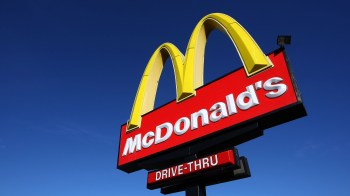
For this fast-food chain, rural Southern towns are the special
For this fast-food chain, rural Southern towns are the special

Americans love to eat out. In the first half of this year, we spent $570.1 billion on eating and drinking away from home. That’s according to the National Restaurant Association. And in small towns, the local fast-food joint can be one of the main gathering places.
Take Eupora, Mississippi; Citronelle, Alabama; and Adamsville, Tennessee. These towns have fewer than 4,000 residents and they’re all home to one particular fast-food chain: Jack’s Family Restaurants. For this rapidly expanding, quick-service restaurant, rural towns are the secret sauce.
On a recent workday, Roy Hollie ordered his favorite sandwich, the Big Bacon, at the Jack’s eatery in Citronelle. He’s an exterminator for a pest-control company and there are seven Jack’s in his rural territory. Hollie gets lunch there a lot.
“Probably once, twice a week, depending on where I’m working, what area I’m in,” Hollie said.
On the other side of the dining room, Robert Jarvis was on his second meal of the day at Jack’s. He said he appreciates having this restaurant in the small town where he grew up.
“There ain’t much here, so you got to eat where you can,” Jarvis said.
Jack’s started in 1960 in Homewood, Alabama, near Birmingham. Today there are 261 restaurants, owned by a big private equity firm, though its jingle is less Madison Avenue and more a nod to its Southern roots.
It goes like this: “You’ll go back, back, back to Jack, Jack, Jack, for more, more, more,” Jarvis said. “Jack’s all about the South.”
Today, Jack’s does open up locations in big cities like Memphis, Tennessee, and Huntsville, Alabama. But about 45% of its outlets are in small towns with populations of 7,000 or less. That kind of rural footprint is unusual for quick-service restaurants.
“Typically, you want to be in fairly highly populated areas, right? Because that’s where saturation is. It’s where growth potential is,” said Scott Taylor, a food and beverage researcher at the University of South Carolina. Jack’s has a smart strategy, he added. “There’s lack of competition. There’s really no saturation.”
And small towns with limited dining options are eager to have a restaurant that opens early and closes late seven days a week.
“The beauty is somebody could come for breakfast and get a plate with, you know, eggs, bacon, a biscuit and hash browns and then come back at dinner and say they want chicken,” said Todd Bartmess, CEO of Jack’s Family Restaurants.
Bartmess said you’ll only find Jack’s in Alabama, Mississippi, Tennessee and Georgia. He added there’s plenty of room to grow in rural communities there.
“Our development strategy is we sort of just go to the next town out,” Bartmess said.
Each new restaurant brings about 40 new jobs to town. But most importantly, Jack’s brings sales tax revenue for the community. “They were expecting to do $1.7 million a year in sales,” Citronelle Mayor Jason Stringer said.
Some of that helps fill the town’s coffers, even with the tax abatement that the mayor said the city gives Jack’s.
There’s one more major ingredient in the Jack’s expansion recipe — truck parking. Mike Holley, no relation to Roy Hollie, was the third trucker in 20 minutes to pull up a big rig at the Jack’s in Citronelle. He stopped there for lunch after hauling cardboard boxes to chicken plants in Mississippi. Holley comes to Jack’s mostly for the parking, but he said, “They’ve got good food, good shakes, good ice cream.”
Those good shakes add up to a lot of business. CEO Todd Bartmess said Jack’s is on track to bring in more than a half a billion dollars in revenue this year.
There’s a lot happening in the world. Through it all, Marketplace is here for you.
You rely on Marketplace to break down the world’s events and tell you how it affects you in a fact-based, approachable way. We rely on your financial support to keep making that possible.
Your donation today powers the independent journalism that you rely on. For just $5/month, you can help sustain Marketplace so we can keep reporting on the things that matter to you.

















